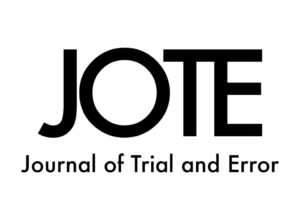JOTE ~ The Journal Of Trial And Error
 The Journal of Trial and Error aims to close the gap between what is researched and what is published. In scientific practice, trial and error is a fundamental process of learning and discovery. Therefore, we want to make public the lessons of the struggles in research. We are convinced about the productive role of errors, and so we aim to publish answers to the question “what went wrong?”, as well as problematising this question by reflecting on what failure means in science. You can read our manifesto to learn further about our goals, and the benefits of publishing errors.
The Journal of Trial and Error aims to close the gap between what is researched and what is published. In scientific practice, trial and error is a fundamental process of learning and discovery. Therefore, we want to make public the lessons of the struggles in research. We are convinced about the productive role of errors, and so we aim to publish answers to the question “what went wrong?”, as well as problematising this question by reflecting on what failure means in science. You can read our manifesto to learn further about our goals, and the benefits of publishing errors.
From the Manifesto
We state that …
Trial and Error is the elementary process in Science by which knowledge is acquired. We differentiate between two types of scientific Trial and Error processes:
– Methodological errors in a practical sense, driving improvement in the understanding and application of techniques. These errors are here understood in a broad sense, those that go beyond the learning of the individual researcher and have an impact at the scale of the scientific community.-
Conceptual flaws, arising from hypothesis being confronted with conflicting observations. When the initial hypotheses are inappropriate in the face of empirical evidence, scientists improve or reject theoretical frameworks by developing alternative theses aimed at increasing empirical adequacy. Not only hits (positive results), but also misses (negative results) are key to scientific progress.
We identify three core problems in today’s Science. Namely, …
… a public image of Science based on breakthrough discoveries, fascinating images, and clear results. This reputation comes at a cost. Both scientists themselves, as well as philosophers, sociologists and historians of science have increasingly been highlighting the importance of science in the making. A more faithful picture of Science, the one of practices and fine-tuning methodologies, seems to be at odds with the unrealistic public image of big-discovery Science.
… a gap between what is published and what is researched. We know positive publication bias pressures scientists to conceal methodological mistakes and discard research containing negative findings, threatening proper interpretation. In the face of failed research —outcomes of Science that do not meet the initial aim of the individual researchers— scientists have two options at hand: not publishing or framing the results as productive by, for example, adding ad-hoc hypotheses in a potentially inadequate manner. This point is a consequence of the expectations of big-discovery Science and the publish-or-perish politics of this Science.
… a replication crisis. Since scientists validate their results in terms of replicability, the present-day situation of unreplicable experiments is a serious problem. Debate on this replication crisis has focused on the misuse of statistics by scientists, on methodological carelessness, or theoretical inappropriateness. Only a few venues are attentive to the potential harm.
[…] The complete Manifesto: https://www.jtrialerror.com/the-manifesto-for-trial-and-error-in-science/
URL Journal: https://www.jtrialerror.com/
Noam Chomsky: Trump Is Consolidating Far-Right Power Globally
 It is no easy task to make sense of U.S. foreign policy in the current era. Trump is wildly unpredictable and lacks any semblance of a coherent view of world affairs, appearing to believe that all it takes is “the art of the deal” to turn “enemies” into friends. Meanwhile, since Trump’s rise to power, the end of U.S. hegemony has come into sight.
It is no easy task to make sense of U.S. foreign policy in the current era. Trump is wildly unpredictable and lacks any semblance of a coherent view of world affairs, appearing to believe that all it takes is “the art of the deal” to turn “enemies” into friends. Meanwhile, since Trump’s rise to power, the end of U.S. hegemony has come into sight.
In the exclusive Truthout interview below, renowned public intellectual Noam Chomsky — one of the world’s most astute critics of U.S. foreign policy in the postwar era — sheds considerable light on the current state of U.S. foreign policy, including Trump’s relations with the leaders of North Korea, Russia and China, as well as his so-called “Middle East Peace Plan.”
C.J. Polychroniou: Noam, in 2016 Trump called U.S foreign policy “a complete and total disaster,” claiming that previous administrations in the post-Cold War era were guided by unrealistic expectations that damaged America’s national interests. Since taking office, he has withdrawn the country from a series of international agreements, demanding that countries pay for U.S. protection, and seeking to advance U.S economic interests through tariffs and protectionism. These moves have led many analysts to speak of a new era in U.S. relations with the world. What’s your own take on Trump’s foreign policy?
Noam Chomsky: One of the most appropriate comments I’ve seen on Trump’s foreign policy appeared in an article in The New Republic written by David Roth, the editor of a sports blog: “The spectacle of expert analysts and thought leaders parsing the actions of a man with no expertise or capacity for analysis is the purest acid satire — but less because of how badly that expert analysis has failed than because of how sincerely misplaced it is … there is nothing here to parse, no hidden meanings or tactical elisions or slow-rolled strategic campaign.”
That seems generally accurate. This is a man, after all, who dismisses the information and analyses of his massive intelligence system in favor of what was said this morning on “Fox and Friends,” where everyone tells him how much they love him. With all due skepticism about the quality of intelligence, this is sheer madness considering the stakes.
And it continues, in ways that are almost surreal. At the recent G20 conference, Trump was asked about Putin’s statement that Western liberalism is obsolete. Trump assumed he must be talking about California: Western liberalism. Putin “may feel that way,” Trump responded: “He sees what’s going on. And I guess, if you look at what’s happening in Los Angeles, where it’s so sad to look; and what’s happening in San Francisco and a couple of other cities which are run by an extraordinary group of liberal people.” Read more
Patrice Lumumba’s Independence Day Speech, June 30, 1960
Men and women of the Congo,
Victorious fighters for independence, today victorious, I greet you in the name of the Congolese government. All of you, my friends, who have fought tirelessly at our sides, I ask you to make this June 30, 1960, an illustrious date that you will keep indelibly engraved in your hearts, a date of significance of which you will teach to your children, so that they will make known to their sons and to their grandchildren the glorious history of our fight for liberty.
For this independence of the Congo, even as it is celebrated today with Belgium, a friendly country with whom we deal as equal to equal, no Congolese worthy of the name will ever be able to forget that is was by fighting that it has been won [applause], a day-to-day fight, an ardent and idealistic fight, a fight in which we were spared neither privation nor suffering, and for which we gave our strength and our blood.
We are proud of this struggle, of tears, of fire, and of blood, to the depths of our being, for it was a noble and just struggle, and indispensable to put an end to the humiliating slavery which was imposed upon us by force.
This was our fate for 80 years of a colonial regime; our wounds are too fresh and too painful still for us to drive them from our memory. We have known harassing work, exacted in exchange for salaries which did not permit us to eat enough to drive away hunger, or to clothe ourselves, or to house ourselves decently, or to raise our children as creatures dear to us.
Read more: https://sfbayview.com/patrice-lumumba
- Page 3 of 3
- previous page
- 1
- 2
- 3



